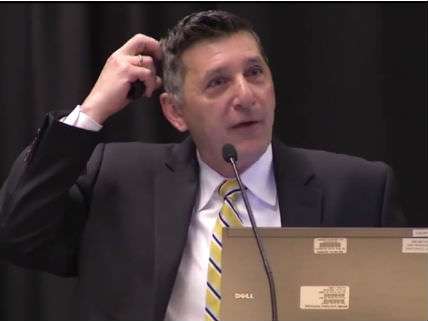Obama's 'Third Way' Looks a Lot Like the War on Drugs

We know President Obama is committed to "drug policy reform" because he keeps telling us he is. Since April 2012, when the phrase first appeared on the White House website, it has been mentioned there 65 times. But what does it mean? According to the latest National Drug Control Strategy, which was released today by the Office of National Drug Control Policy (ONDCP), "we must seek to avoid over-simplified debates between the idea of a 'war on drugs' and the notion of legalization as a panacea." Fans of Obamaspeak will appreciate the way that sentence poses a false choice while renouncing false choices. After all, legalization need not be a "panacea," or anything resembling one, to be better than the disastrous war on drugs, which Obama himself once called "an utter failure."
What is the president offering in its place? "Drug use and its consequences are complex phenomena requiring an array of evidence-based policy responses," the ONDCP says. Understanding this reality, "the Administration remains committed to charting this 'third way' toward a healthier, safer, and more prosperous America." But in practice, Obama's "third way" looks an awful lot like the first way, because he refuses to renounce the use of violence to stop people from consuming politically incorrect drugs.
The administration does endorse some sensible harm-reducing policies, including syringe exchange programs that curtail the spread of blood-borne diseases, wider availability of the opioid antagonist naloxone to prevent overdose fatalities, and the adoption of laws that shield people who report overdoses from criminal liability. But Obama's notion of a more enlightened and compassionate drug policy seems to consist mainly of forcing illegal drug users to choose between jail and "treatment." That makes sense, according to the ONDCP, because "substance use disorders are medical conditions." Therefore illegal drug users should be treated just like people afflicted with cancer or heart disease, who are routinely forced to undergo treatment by the threat of imprisonment.
On second thought, maybe that's not such a good comparison. What about alcoholics, who surely are just as afflicted with a substance use disorder as people who favor marijuana, cocaine, meth, or heroin? Nope, heavy drinkers are not compelled to undergo treatment either (unless they harm or endanger others while under the influence). So how is it logical or fair to treat marijuana, cocaine, meth, or heroin addicts like criminals, especially since the ONDCP insists that it's wrong to think "someone with a substance use disorder is exhibiting a willful choice rather than suffering from a recognized medical condition"? As Bill Piper, director of national affairs at the Drug Policy Alliance, observes, "The Administration says drug use is a health issue but then advocates for policies that put people in the criminal justice system."
To its credit, the administration thinks some drug offenders should spend less time in that system. It supported less severe penalties for crack offenses, and it favors additional sentencing reforms. The ONDCP regrets that "the United States has the largest per capita prison population in the world," and it cites Attorney General Eric Holder's effort to curtail the use of mandatory minimum sentences "for certain nonviolent, low-level drug offenses." At the same time, the administration believes "serious, high-level, or violent drug traffickers" deserve "the most severe mandatory minimum penalties." That description covers plenty of people whose only crime is engaging in peaceful, consensual transactions. For helping people do what the administration says is not really a crime, they go to prison for years or decades.
Aside from sentencing reform (and clemency, assuming Obama follows through on his rumored plans to commute hundreds or thousands of drug sentences), the president's most significant drug policy legacy may prove to be his grudging tolerance of marijuana legalization in Colorado and Washington. The ONDCP presents the decision not to challenge those laws or go after state-licensed marijuana growers and sellers as an exercise in drug law enforcement. "In August," it says, "DOJ released guidance reiterating that marijuana remains illegal under Federal law and that Federal law enforcement activities in these two states would continue to be guided by eight priorities focused on protecting public health and safety."
While Obama deserves credit for letting these experiments proceed (and for admitting that marijuana is less dangerous than alcohol, a point that ONDCP Acting Director Michael Botticelli also has conceded), the administration in other ways continues to display an irrational anti-pot prejudice that is hardly consistent with the "evidence-based policy responses" it claims to support. To this day it defends the proposition that marijuana belongs on Schedule I of the Controlled Substances Act, which is supposedly reserved for drugs with a "high potential for abuse" that have "no currently accepted medical use" and are so dangerous that they cannot be used safely, even under a doctor's supervision. The ONDCP bemoans reductions in the percentage of teenagers who think trying marijuana or using it occasionally poses "a great risk," even though the truth is that trying marijuana or using it occasionally doesn't pose a great risk.
Perhaps most gratuitiously, the administration continues to back "zero tolerance" drugged driving laws that treat people with any trace of marijuana in their blood as public menaces even when they are not impaired at all. The ONDCP likes that standard, which makes even less sense than the excessively strict five-nanogram rule recently adopted by Washington state, because it "increases the ability to prosecute drivers using drugs other than alcohol without specifying a bodily fluid concentration." But if the point is protecting the public from impaired drivers, shouldn't there be some evidence that the drivers who are prosecuted actually were impaired? Not if the ostensible concern for road safety is just an excuse to punish people for smoking pot. If you believe the ONDCP, that is the sort of mindlessly tough policy that comes from "relying on science, research, and evidence to improve public health and safety in America."


Show Comments (82)